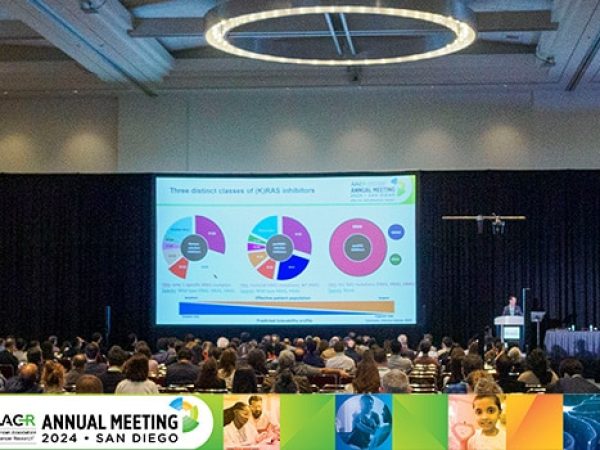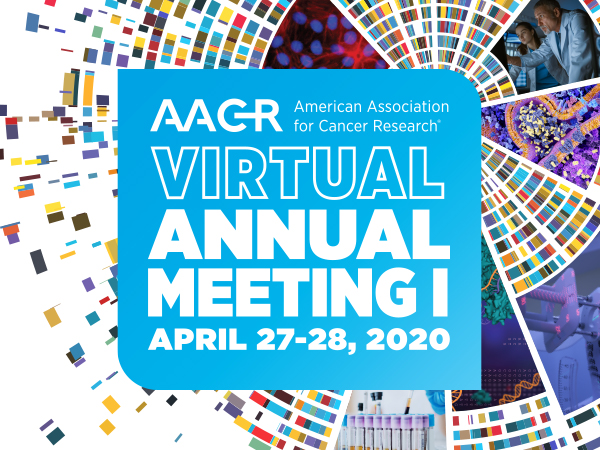AACR Annual Meeting 2023: Welcoming Global Scholars in Training
The American Association for Cancer Research (AACR) is proud to offer Global Scholar-in-Training Awards (GSITA) to support the career development of meritorious early-career scientists from countries building cancer research capacities. This month, the GSITA program, now in its fifth year, will bring promising scientists from 10 countries—Argentina, Brazil, China, Egypt, India, Jordan, Malawi, Nigeria, Peru, and Thailand—to participate in AACR Annual Meeting 2023.
The awardees are:
- Bayan Abu AlRagheb, The University of Jordan, Amman, Jordan
- Ayodeji Adegoke, PhD, University of the Free State, Bloemfontein, South Africa
- Anshika Chauhan, Post Graduate Institute of Medical Education and Research (PIGMER), Chandigarh, India
- Montana Manselle Cocco, Instituto de Biologia y Medicina Experimental (CONICET), Buenos Aires, Argentina
- Andres Elia, Instituto de Biologia y Medicina Experimental (CONICET), Buenos Aires, Argentina
- Salma Fala, MD, Suez Canal University, Faculty of Medicine, Ismailia, Egypt
- Vidit Gaur, Indian Institute of Technology Delhi (IIT Delhi), New Delhi, India
- Yazan Hamadneh, The University of Jordan, Amman, Jordan
- Abram Kamiza, PhD, University of the Witwatersrand, Johannesburg, South Africa
- Kelly Meza, MD, Instituto Nacional de Enfermedades Neoplasicas, Lima, Perú
- Aditi Patel, Ahmedabad University, Ahmedabad, India
- Agustina Sabater, Institute of Biological Chemistry of the School of Sciences (IQUIBICEN), National Scientific and Technical Research Council (CONICET), Buenos Aires, Argentina
- Juliana Siqueira, PhD, Brazilian National Cancer Institute (INCA), Rio de Janeiro, Brazil
- Kamonlapat Supimon, PhD, Faculty of Medicine Siriraj Hospital, Mahidol University, Bangkok, Thailand
- Jiazhang Xing, Peking Union Medical College, Beijing, China
Visit the GSITA page to learn more about this year’s class.
As the 2023 scholars prepare for the meeting, several of last year’s recipients shared highlights of their experience.
Babajide Ajayi, PhD, Ajayi Crowther University, Oyo, Nigeria
Who do you think makes a great candidate for the GSITA?

I highly recommend that postgraduate students and early career researchers who are involved in cancer research apply for the GSITA program, as it can be an excellent investment in their professional development and career advancement. By attending the AACR Annual Meeting through the GSITA program, postgraduate students and early-career researchers can gain access to the latest research and findings in the field. This exposure can help them stay current with trends and generate new ideas for their own research projects. Moreover, the conference provides a unique opportunity to network with other cancer researchers, including leading experts in the field. This networking can help them build connections that may lead to future collaborations or job opportunities.
Additionally, the AACR Annual Meeting offers countless opportunities for professional development, such as attending workshops or sessions on grant writing, career development, and other essential skills. Furthermore, researchers can present their research findings and receive valuable feedback, which can help them broaden their horizons and develop a global perspective on cancer research.
How has your experience with the GSITA program influenced the work you are doing in Nigeria?
At present, my research is primarily focused on investigating the mechanisms of resistance to immunotherapy in cancer. Also, I am delving deep into the exploration of natural products, such as 6-gingerol, which comes from the ginger plant, as a potential strategy to modify the tumor microenvironment and improve cancer treatment outcomes. I was inspired to pursue this topic during the AACR Annual Meeting 2022, and since then, I have been passionately dedicated to applying my knowledge to make a meaningful impact in the fight against cancer. My ultimate goal is to discover novel pathways of immunotherapy resistance in cancer and unlock new therapeutic targets that can overcome resistance and transform the lives of those affected by cancer.
By accessing cutting-edge technologies and collaborating with experts in the field, I am confident that my work can lead to the development of more effective cancer treatments in Nigeria, where the burden of this disease is overwhelming, and access to advanced therapies is limited. Finally, I am committed to making a positive impact in the fight against cancer and believe that my research has the potential to transform the landscape of cancer treatment not only in Nigeria but globally.
How did you share information from the Annual Meeting with colleagues at home?
The AACR Annual Meeting 2022 provided me with an excellent opportunity to gain exposure to the latest developments in cancer research, treatment, and care. By attending this meeting, I was able to prepare for the next stage of my career by learning about emerging trends and technologies in cancer immunotherapy, networking with other professionals, and exchanging ideas and information. To apply this knowledge to improving patient outcomes in Nigeria, I have organized meetings with my colleagues. where we have discussed the presentations from the AACR Annual Meeting 2022, new research findings, and emerging trends in cancer research. This has been an interactive forum where colleagues ask questions, discuss ideas, and share their own experiences and perspectives.
Andrea Anampa-Guzmán, Universidad Nacional Mayor de San Marcos, San Fernando Medical school, Lima, Perú
How did your attendance at the Annual Meeting assist in refining your research and career path?

When I first heard about the GSITA program, I hesitated to apply. I was worried that I would not fit in because my research focused more on clinical than basic research. However, I decided to push through my fears and apply anyway. And I am so glad I did because attending the AACR Annual Meeting 2022 was a life-changing experience for me. The conference allowed me to expand my oncology knowledge and interact with renowned researchers and oncologists, which led to collaborations and networking opportunities. It also helped me prepare for the next stage in my career by exposing me to innovative research, novel therapeutic approaches, and the latest advancements in cancer care.
Attending the Annual Meeting exposed me to different research areas and approaches to cancer care. The knowledge I gained from the conference broadened my perspective on cancer care and treatment, allowing me to identify gaps in cancer research in Perú and work toward bridging those gaps.
How does your home country or culture influence your work?
Perú has a high incidence of cancer and limited resources to address the disease’s complex and varied needs. This reality has driven my passion for global oncology research—specifically, it has inspired me to identify and address cancer disparities in low- and middle-income countries. Sharing information from the Annual Meeting with my research team and peers back home in Perú was essential to my experience. My presentations on cancer research and cancer health disparities also enabled me to raise awareness and educate others in my community about ongoing cancer research.
Who do you think makes a great candidate for the GSITA?
I would recommend the GSITA to any student, postdoctoral fellow, or young investigator interested in cancer research. The award provides an excellent opportunity to attend the AACR Annual Meeting, present your research, and connect with researchers and oncologists worldwide.
Michelle Guevara Nieto, MSc, PhD (c), Instituto Nacional de Cancerologia – Universidad Nacional de Colombia, Bogotá, Colombia
How does your home country or culture influence your work?

Coming from a middle-income country like Colombia has inspired me to work in cancer research. My home country presents considerable heterogeneity in the genetic ancestry of its citizens as well as in their access to health care. This creates an ideal research opportunity to study underrepresented groups within the population to improve their quality of life and reduce current disparities.
How do you see the GSITA furthering your opportunities?
Receiving the GSITA enabled me to attend the AACR Annual Meeting 2022, which was a valuable opportunity for me to network with international colleagues in all stages of their careers, and to exchange resources and expertise while engaging with the AACR community at large. My participation in the AACR Annual Meeting provided me with an environment to discuss my work with other experts in the field, initiate collaborations, and receive feedback that could impact my research strategy. Additionally, I learned the importance of using social media effectively to share current discoveries and research trends with other researchers from around the world.



